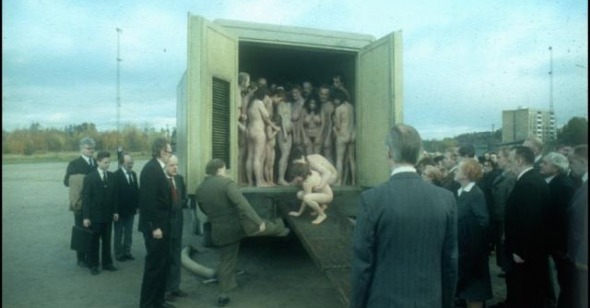Open and Closed
Adam Nayman on World of Glory
“The opening scene of World of Glory is a reconstruction of events during the Second World War and of the total brutality which marked "ethnic cleansings". That term did not exist then, it was called the "final solution", but meant the extermination of Jews, Gypsies, homosexuals and political dissidents. Human beings were put to death by, among other methods, gassing in diesel-driven, closed vans. The gas from the motor was piped into the storage compartment. These vans were the forerunners of the gas chamber.” —Roy Andersson
And there you have it: the opening shot of the 1991 short film World of Glory (available on the Cinema 16: European Short Films disc) as explained by its director, Roy Andersson. In three agonizing minutes, the shot—which is static and meticulously detailed in the manner of Andersson’s subsequent, millennial-anxiety masterpiece Songs from the Second Floor—describes human beings being put to death in a diesel-driven van. We see them huddling together naked before the door is closed by a lumpy little man (he kicks the loading ramp into place when it gets stuck) and the hose attached to the exhaust pipe is inserted into the compartment; we hear their screams grow frantic and then faint as the van drives away towards the back of the frame. It circles in the distance as the assembled witnesses—pale people with no discernable reason for being there—take in the atrocity with blank stares. Cut.
If it’s possible for a sequence be completely ambiguous and completely unambiguous, here it is. On one hand, it plunges us into a nightmare with no exposition, no warm-up, no warning. Who are the people in the truck? Why are they being killed? Why are the people around the truck not helping them? Where are we? When are we? But there’s no question about what we’re looking at. The names and places and whys are irrelevant: this is what genocide—actual, unimagined, twentieth-century genocide—looks like.
I have cried and cried out at many films in my life, but I have never again made a sound like the one that escaped my lips during World of Glory. Something between an incredulous chuckle (“I can’t believe he’s doing this”) and a barely swallowed eruption that could have been a sob or a dry heave. I can’t recall if my viewing partner (a fellow Reverse Shot writer) had a comparably visceral reaction, but I do know that when the film ended about ten minutes later we sat together in a daze. If World of Glory were only three minutes long, it might qualify as the most shattering thing I’ve ever seen. The scenes that follow its jaw-dropping opening are perfectly realized pitch-black vignettes that feel very much like a dry run for Songs from the Second Floor, but they are, despite their shades-of-grey palette and studied bleakness, far easier to take than what preceded them.
World of Glory locates a society—ostensibly the director’s native Sweden, but easy interchangeable with any modern European country—so paralyzed by ennui, anxiety, and desperation that its inhabitants are apparitions. The main character is a thin, pasty man who takes us on a guided tour of his life—his loveless marriage, his stultifying job, his pathetic day-to-day activities. It was not until the second time I saw the film that I realized that this character had been present in the first shot: dead center of the frame, turning away from the proceedings every so often to fix us with his gaze. His meek, self-effacing misery in the later scenes thus comes into sharper relief: a person who does not act to avert tragedy endures beneath its weight.
Andersson has spoken about why the opening sequence, which so obviously references the Holocaust, makes no attempt at period design. “In the first two years of my life,” he wrote in 1997, “millions of people were gassed to death in the most bestial manner, in a neighboring country with literacy and traditions that very much resembled our own. This has always pursued me and does still. I should like to say that I am shamed by these crimes, on behalf of humanity." This is a grand statement, but the brief and enormous film to which it is attached lives up to it. “Not in my name” is a familiar refrain in an agitprop culture. World of Glory is the only film that I wish that I’d been brave and brilliant and aware enough to make myself.
